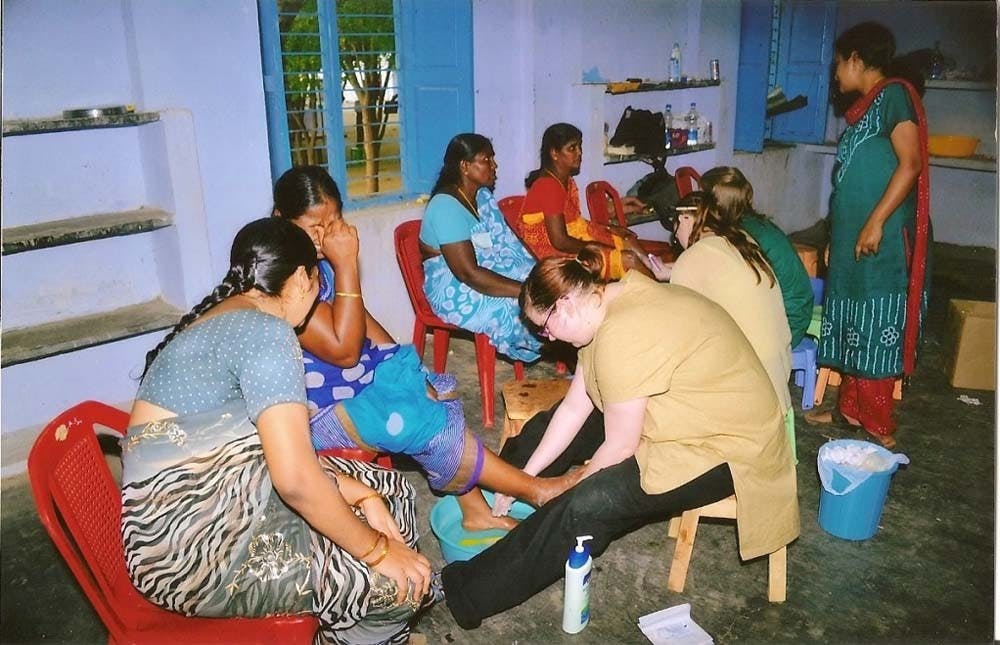Students spend 11 days teaching women’s health and working with orphans
(Photo Courtesy of Lily-Claire Orme)
By Amanda Blas, Staff Writer -- blas13@up.edu
Eight UP nursing students and three faculty members made an 11-day trip to India, where they practiced their nursing skills, promoted health care education among natives and worked with children in an orphanage.
"The purpose of the trip was to give free basic medical care to people as well as women's health care education," senior Erin Kozlowski said.
Students spent their first couple of days at a rural campus in Narasaraopet, a village in southeastern India, where people received healthcare and education. In the following days, students traveled to small villages around the main campus to reach people who could not meet them at the main campus.
"The immensity of it was amazing," graduate student Suzie Rice, who is part of the School of Nursing's alternate entry master's program, said. "We saw over a thousand people in 10 days."
"It was more than we expected," Kozlowski said.
The education was aimed at women. Students talked about topics such as breast cancer, self-breast examinations, fertility and how to recognize symptoms indicating a child needs to see a doctor.
"On the last trip that was made to India, the women were asked what health issues they wanted to know more about," Lily-Claire Orme, who is also part of the School of Nursing's AEMUP program, said. "Those issues were fertility, breast health, and when to take your child to the doctor."
Foot care was another major healthcare topic. People in rural India often do hard labor, walk far distances and rarely wear shoes, which can lead to a lot of foot and knee pain.
"We taught them how to use a tennis ball as a stretching device," Orme said. "But every single kid in the village thought we were just giving out tennis balls, which was kind of amusing."
In addition to conducting healthcare assessments and education, students also participated in grief work with orphans in a two-day seminar.
On the first day, volunteers discussed the grief and loss the orphans experienced. On the second day, they got to meet the orphans and do art projects with them.
It gives them the chance to express themselves," Orme said.
The volunteers also presented the orphans with memory books, a concept conceived by UP alumna Tamara Faris.
"The principle behind the memory books is that these orphans hold so much in that they don't know how to verbalize, and also because they're so young or have no one to tell it to," Orme said.
The books help with the children's self-expression, giving them different activities to help share their story.
"There's a ceremony where we hand the books out," Orme said. "They just light up. It's amazing."
Besides being able to practice their nursing skills, the students were also able to be part of a multicultural experience.
"We got to know the women and culture of India through our assessments," Rice said.
India's culture and beliefs played an important role in the way the students handled their assessments. For example, when it came to washing feet for foot care education, it manifested itself as a cultural experience as well.
"It was very emotional because usually only those of the higher caste get their feet washed," Kozlowski said. "It showed we respected them."
According to Rice, students' exposure to a different culture will help them in their future nursing careers.
"It will make me more culturally competent, especially when it comes to different ailments," Rice said.
However, being immersed in a different culture did have its share of problems. Because many of the people in India speak Telugu rather than English, students experienced a language barrier.
"We used a lot of body language and factual and upfront phrases," Kozlowski said. "It was frustrating for us and for them as well."
According to Rice, the nursing students' experiences during their trip to India touched them.
"Just the fact that the women we saw will take the information we gave them and share it with others is far-reaching," Rice said.








